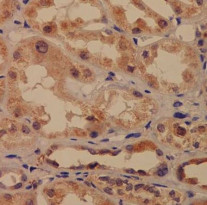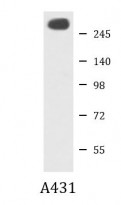ARG42798
anti-Acetyl Coenzyme A Carboxylase antibody
anti-Acetyl Coenzyme A Carboxylase antibody for IHC-Formalin-fixed paraffin-embedded sections,Western blot and Human,Mouse,Rat
Overview
| Product Description | Rabbit Polyclonal antibody recognizes Acetyl Coenzyme A Carboxylase |
|---|---|
| Tested Reactivity | Hu, Ms, Rat |
| Tested Application | IHC-P, WB |
| Host | Rabbit |
| Clonality | Polyclonal |
| Isotype | IgG |
| Target Name | Acetyl-CoA Carboxylase Alpha |
| Antigen Species | Human |
| Immunogen | Synthetic peptide derived from Human Acetyl Coenzyme A Carboxylase. |
| Conjugation | Un-conjugated |
| Alternate Names | ACC; ACACAD; Acetyl-CoA carboxylase 1; ACAC; EC 6.4.1.2; ACCA; EC 6.3.4.14; ACC-alpha; ACC1 |
Application Instructions
| Application Suggestion |
|
||||||
|---|---|---|---|---|---|---|---|
| Application Note | * The dilutions indicate recommended starting dilutions and the optimal dilutions or concentrations should be determined by the scientist. | ||||||
| Positive Control | A431 |
Properties
| Form | Liquid |
|---|---|
| Purification | Affinity purified. |
| Buffer | PBS (pH 7.4), 150 mM NaCl, 0.02% Sodium azide and 50% Glycerol. |
| Preservative | 0.02% Sodium azide |
| Stabilizer | 50% Glycerol |
| Storage Instruction | For continuous use, store undiluted antibody at 2-8°C for up to a week. For long-term storage, aliquot and store at -20°C. Storage in frost free freezers is not recommended. Avoid repeated freeze/thaw cycles. Suggest spin the vial prior to opening. The antibody solution should be gently mixed before use. |
| Note | For laboratory research only, not for drug, diagnostic or other use. |
Bioinformation
| Database Links | |
|---|---|
| Gene Symbol | ACACA |
| Gene Full Name | acetyl-CoA carboxylase alpha |
| Background | Acetyl-CoA carboxylase (ACC) is a complex multifunctional enzyme system. ACC is a biotin-containing enzyme which catalyzes the carboxylation of acetyl-CoA to malonyl-CoA, the rate-limiting step in fatty acid synthesis. There are two ACC forms, alpha and beta, encoded by two different genes. ACC-alpha is highly enriched in lipogenic tissues. The enzyme is under long term control at the transcriptional and translational levels and under short term regulation by the phosphorylation/dephosphorylation of targeted serine residues and by allosteric transformation by citrate or palmitoyl-CoA. Multiple alternatively spliced transcript variants divergent in the 5' sequence and encoding distinct isoforms have been found for this gene. [provided by RefSeq, Jul 2008] |
| Function | Cytosolic enzyme that catalyzes the carboxylation of acetyl-CoA to malonyl-CoA, the first and rate-limiting step of de novo fatty acid biosynthesis (PubMed:20952656, PubMed:20457939, PubMed:29899443). This is a 2 steps reaction starting with the ATP-dependent carboxylation of the biotin carried by the biotin carboxyl carrier (BCC) domain followed by the transfer of the carboxyl group from carboxylated biotin to acetyl-CoA (PubMed:20952656, PubMed:20457939, PubMed:29899443). [UniProt] |
| Cellular Localization | Cytoplasm. [UniProt] |
| Calculated MW | 266 kDa |
| PTM | Phosphorylation on Ser-1263 is required for interaction with BRCA1. [UniProt] |
Images (2) Click the Picture to Zoom In
-
ARG42798 anti-Acetyl Coenzyme A Carboxylase antibody IHC-P image
Immunohistochemistry: Paraffin-embedded Human kidney tissue stained with ARG42798 anti-Acetyl Coenzyme A Carboxylase antibody.
-
ARG42798 anti-Acetyl Coenzyme A Carboxylase antibody WB image
Western blot: A431 cell lysate stained with ARG42798 anti-Acetyl Coenzyme A Carboxylase antibody.







